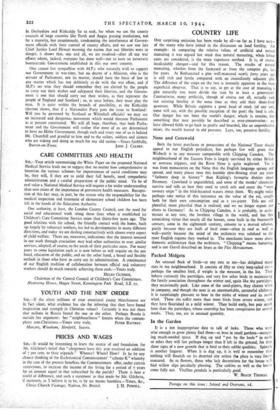COUNTRY LIFE
ONE surprising omission has been made by all—so far as I have seen— of the many who have joined in the discussion on land fertility. For example: in comparing the relative values of artificial and natural manuring it was argued last week that natural manuring, when labour costs are considered, is the more expensive method. It is, of course, incalculably cheaper—and for this reason. The results of natural manuring, whether from the farmyard or from the compost pit, last for years. At Rothamsted a plot well-manured nearly forty years ago is still rich and fertile compared with an immediately adjacent plot. The difference of the crops on the two is instantly apparent to the most superficial observer. That is to say, to get at the cost of manuring a plot naturally you must divide the sum by at least a generation! Contrariwise, many artificials, though of course not all, actually cash out existing fertility at the same time as they add their short-lived quantum. While Britain supports a good head of stock (of any sort, some will say, with the possible exception of the goat) the land is safe. Our danger has not been the world's danger, which is erosion, but something that may possibly be described as over-conservation: we have allowed fields to go back to prairie and hoarded, like an unproductive miser, the wealth buried in old pastures. Leys, too, preserve fertility.
Nene and Cotswold Both the latest purchases or possessions of the National Trust should appeal to our English prejudices, but perhaps few will grant that Wisbech is in any measure comparable with Chipping Camden. The neighbourhood of the Eastern Fens is largely unvisited by either British or overseas trippers, and the River Nene is quite neglected. Yet it was from monasteries on the Nene that the English language sprang and spread, and many places near this humble slow-flowing river are more "fathoms deep in history" than Kipling's favourite district about Pevensey. Crowland is unparalleled, and some of the monks' chronicles survive and tells us how they used to catch eels and snare the "most savoury snipe" in the bird-haunted waters about them. We might today perhaps take notice of this insistence on the value of the eel, caught both for their own consumption and as a tax-payer. Eels are still plentiful, more plentiful than is realised, and we no longer export our elvers to Germany! As to Chipping Camden, it is probably, in archi- tecture at any rate, the loveliest village in the world, and has this astonishing virtue that nearly all the houses, some built in the fourteenth century, some in the eighteenth century, consent to a mutual relation, partly because they are built of local stone—often in roof as well as wall—partly because the mind of the architects was subdued to the most English regions they worked in. The merchants knew more about domestic architecture than the architects. " Chipping " means bartering, and is not Grevil described on brass as the Flos Mercatorum.
Packed Midgets An unusual flock of birds—at any rate to me—has delighted manY eyes in my neighbourhood. It consists of fifty or sixty long-tailed tits— perhaps the smallest bird, if weight is the measure, in the list. They behave curiously like partridges, and very few other birds in maintaining the family association throughout the winter and, again like the partridges; they occasionally pack. Like some of the sand-pipers, they chatter when in company, and though the note is an unremarkable, untuneful sibilance, It is surprisingly pleasant to hear in the midst of winter and its north wind. These tits suffer more than most birds from severe winter, and they have flourished in a mild winter. They build early, but pair much later than the partridges, whose courtship has been conspicuous for several weeks. They, too, are in unusual quantity.
In the Garden It is a not inappropriate date to talk of leeks. Those who were wise enough to grow plenty find them—at least in small gardens—occupy- ing much-needed space. If dug up and "pus by the heels" in earth or ashes they will last perhaps longer than if left in the ground, for they show signs of a new growth that is fatal to their edible qualities. Spinach is another lingerer. When it is dug up, it is well to remember that nothing will flourish on its deserted site unless the place is very free" manured. As to flowers, those who lack decorations for the house wit find willow slips peculiarly pleasing. The catkins as well as the leaves come fully out. Vitellina pendula is particularly good. W. BEACH THOMAS.
Postage on this issue : Inland and Overseas, id.


























 Previous page
Previous page